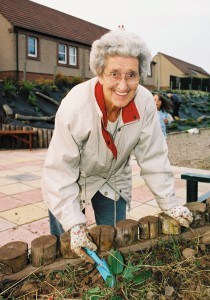
Well, it’s been a dizzying couple of months for me; lots of research, visiting projects, training, shadowing other TCV staff, conferences, events and generally finding my feet. The spring shoots, sunshine and showers are here at last and I am beginning to get out there into the fresh air with my fist workshop groups. But before I come on to that I just want to tell you a bit more about the thinking behind the Ageing Well project, particularly the idea of Natural Exercise.
So, “Natural Exercise”: a big focus of my traineeship will be helping older people who live in care homes and sheltered housing to engage in so called “Natural” or “Green Exercise”- this just means doing anything active outdoors in green spaces: that could include things like gardening, walking, jogging or doing a bit of conservation work.
But why is Natural Exercise good for older adults?
1) Physical Exercise: As we all know physical exercise is important for our health. Physical exercise in older adults can maintain essential strength and balance and also reduce the likelihood of falling (and help people get up again if they do fall). Recent evidence also suggests that physical exercise may also have a role in maintaining and enhancing brain function in older adults and may even slow the onset of dementia [1]
2) Spending in green space: Being outside and having regular contact with nature in our day to day lives is increasingly being suggested to be important for maintaining good mental health and wellbeing and can be an effective therapy for people with poor mental health [2]. Studies have shown that older gardeners often have better mental health than non gardeners and also that engaging in gardening activities can improve mental health in those who have never gardened before [3]. Even indoor gardening activities for adults in care homes have appeared to improve their wellbeing [4].
So, the idea of natural exercise is so great because it combines these two therapeutic activities- giving you the physical health benefits from doing exercise and the mental health and wellbeing benefits from spending time outdoors in green spaces. So a win-win situation!
With an ageing population and increasing numbers of people being diagnosed with dementia, finding therapies that help to increase people’s mental and physical wellbeing without a reliance on drugs is becoming increasingly important. “Natural Exercise” could have an important role in this.
With all of that in mind I have spend the last couple of months devising my own natural exercise introductory workshops which I have been offering to care homes and housing associations in the Froth Valley area. More to follow on them in my next entry…
For now here is a bit of further reading on green spaces, natural exercise and older people –
1) Physical Exercise and Brain Functions in Older Adults. 2014. Physical Exercise and Brain Functions in Older Adults. Available at: http://www.ncbi.nlm.nih.gov/pmc/articles/PMC3791662/. [Accessed 11 April 2014].
2) Why green is good for you. Jay Griffiths. Available at: http://www.theguardian.com/commentisfree/2014/jan/08/green-space-combat-depression-mental-health.
3) What is the Evidence to Support Therapeutic Gardens for the Elderly? 2012. Available at: http://www.ncbi.nlm.nih.gov/pmc/articles/PMC3372556/pdf/pi-9-100.pdf.
4) The Effects of a Horticulture Activity Program on the Physiological Well-Being of Older People in a Long-Term Care Facility. 2003. Available at: http://horttech.ashspublications.org/content/13/1/81.full.pdf
5) Living with Dementia and Connecting with Nature – Looking Back and Stepping Forwards. Dementia Adventure. 2010. Available at: http://www.dementiaadventure.co.uk/uploads/green-exercise-and-dementia-neil-mapes-february-2011.pdf

